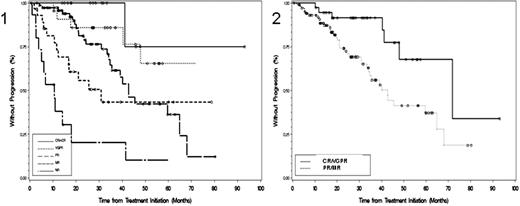Abstract
Abstract 4993
The attainment of higher response rates, as well as better categorical responses has occurred with the introduction of novel biological agents, including rituximab in the treatment of WM. However, there is a paucity of knowledge as to whether the attainment of better categorical responses is associated with improved outcomes. We therefore analyzed the impact of categorical responses on progression free survival (PFS) in 159 WM patients naïve to rituximab therapy and who received a rituximab based regimen: cyclophosphamide (n=58), nucleoside analogue (n=43), immunomodulatory agent (n=35), or bortezomib (n=23). The median follow-up for all patients was 83.5 months. Baseline characteristics were as follows: median age 62 years; serum IgM 3670 mg/dL; hematocrit 31.7%. Eighty-two patients had a B2M ≥3.0 g/L, and the IPSS score was I (n=64); II (n=57) and III (n=38). One hundred eight (68%) patients were previously untreated. Categorical responses were as follows: Complete Response (CR) defined as absence of clinically evident bone marrow or extramedullary disease, normal range serum IgM and negative immunofixation study (n=14); Very Good Partial Response (VGPR) defined as ≥90% reduction in serum IgM (n=21); Partial Response (PR) defined as ≥ 50% to <90% reduction in serum IgM (n=79); Minor Response (MR) defined as ≥ 25% to <50% in serum IgM (n=30); No Response (NR; n=14). No association between categorical response attainment and baseline serum IgM, B2M, Hematocrit or IPSS score was observed when employing a proportional hazards model. Achievement of better categorical responses was incrementally associated with improved PFS (p<0.0001 by log rank analysis), including attainment of a minor response, in both previously untreated and treated patients. No separation of curves was observed between VGPR and CR (Figure 1). Median TTP for patients achieving CR or VGPR was 71.8 months versus 38.6 months for those with PR or MR (Figure 2; p=0.008). Attainment of at least a VGPR served as an independent marker for improved PFS by univariate analysis. The results suggest that categorical responses, including MR and VGPR have prognostic value in WM, and that efforts aimed at improving categorical responses may lead to improved treatment outcomes in patients with WM.
No relevant conflicts of interest to declare.
Author notes
Asterisk with author names denotes non-ASH members.


This feature is available to Subscribers Only
Sign In or Create an Account Close Modal